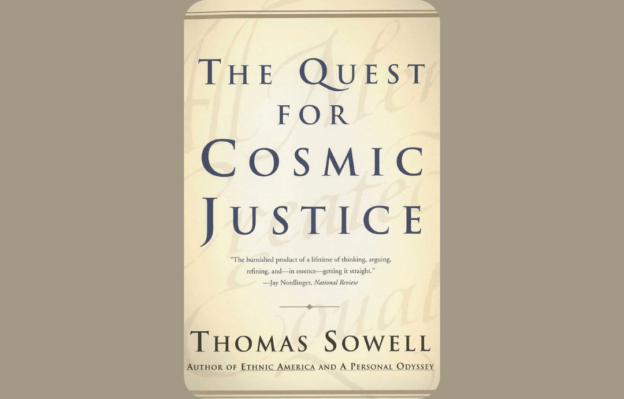A critical analysis of “The Quest for Cosmic Justice” by Thomas Sowell…
Overview:
In “The Quest for Cosmic Justice” Thomas Sowell delves into the philosophical, moral, and economic implications of social justice and its quest to rectify perceived historical and societal inequities. Sowell contrasts “cosmic justice” (an aspirational, idealized form of justice) with traditional justice, positing that the former’s pursuit can often lead to undesirable societal consequences and can even challenge the foundational principles of freedom and individual rights.
Strengths:
- Clarification of Concepts: One of the book’s major strengths is how Sowell delineates between traditional justice and what he terms “cosmic justice.” This differentiation is vital in understanding his critiques and arguments throughout the text.
- Thought-Provoking: Sowell challenges widely accepted premises about equality, fairness, and social justice. Whether or not one agrees with his perspective, his arguments compel readers to critically analyze their own beliefs.
- Economic Insights: Drawing on his background in economics, Sowell offers comprehensive economic arguments to bolster his philosophical and moral points, providing a multi-dimensional critique of redistributive policies.
- Clear and Accessible Writing: Sowell’s articulate prose makes complex philosophical and economic concepts accessible to a general audience.
Critiques:
- Perceived Bias: Critics argue that Sowell sometimes presents a biased view, especially when discussing government interventions and policies meant to address societal inequities.
- Undermining Social Justice Initiatives: While Sowell offers valid concerns about the unintended consequences of some social justice policies, critics feel that he sometimes broadly paints these initiatives, undermining the genuine need and positive impacts of many social justice endeavors.
- Limited Scope: Sowell mainly focuses on the pitfalls of cosmic justice without providing a comprehensive exploration of the benefits or successes of policies intended to rectify societal inequalities.
- Emphasis on Individualism: Sowell’s strong emphasis on individual rights and responsibilities might downplay the structural and systemic factors that can impede individual progress.
Conclusion:
“The Quest for Cosmic Justice” is a provocative examination of social justice from a perspective that is often contrary to mainstream discourse. Sowell offers a cautionary perspective on the potential hazards of well-intentioned societal interventions. The book serves as a potent counterpoint to popular notions of justice and fairness, prompting readers to consider the broader implications of their beliefs and the policies they support. Whether one aligns with Sowell’s perspective or not, the book undeniably sparks critical thought and discussion on the nature and pursuit of justice in society.
